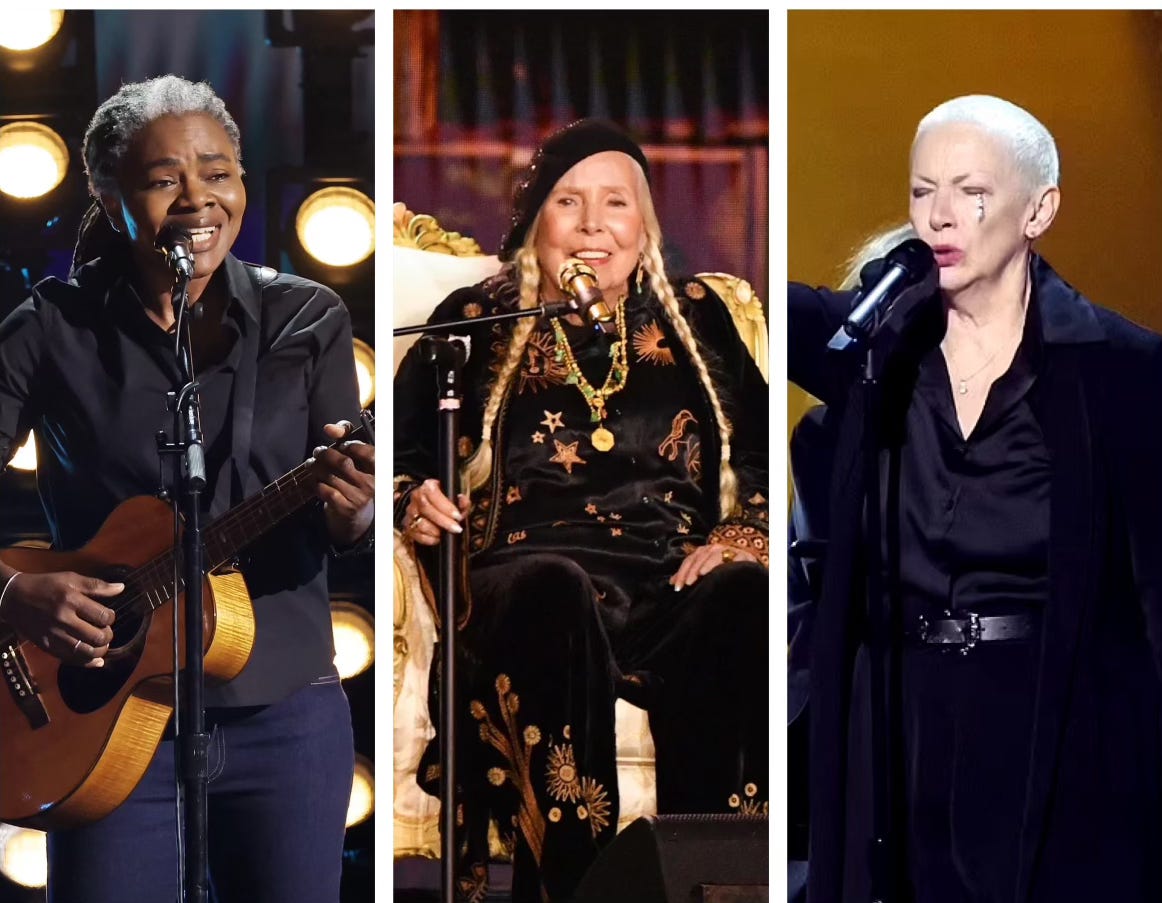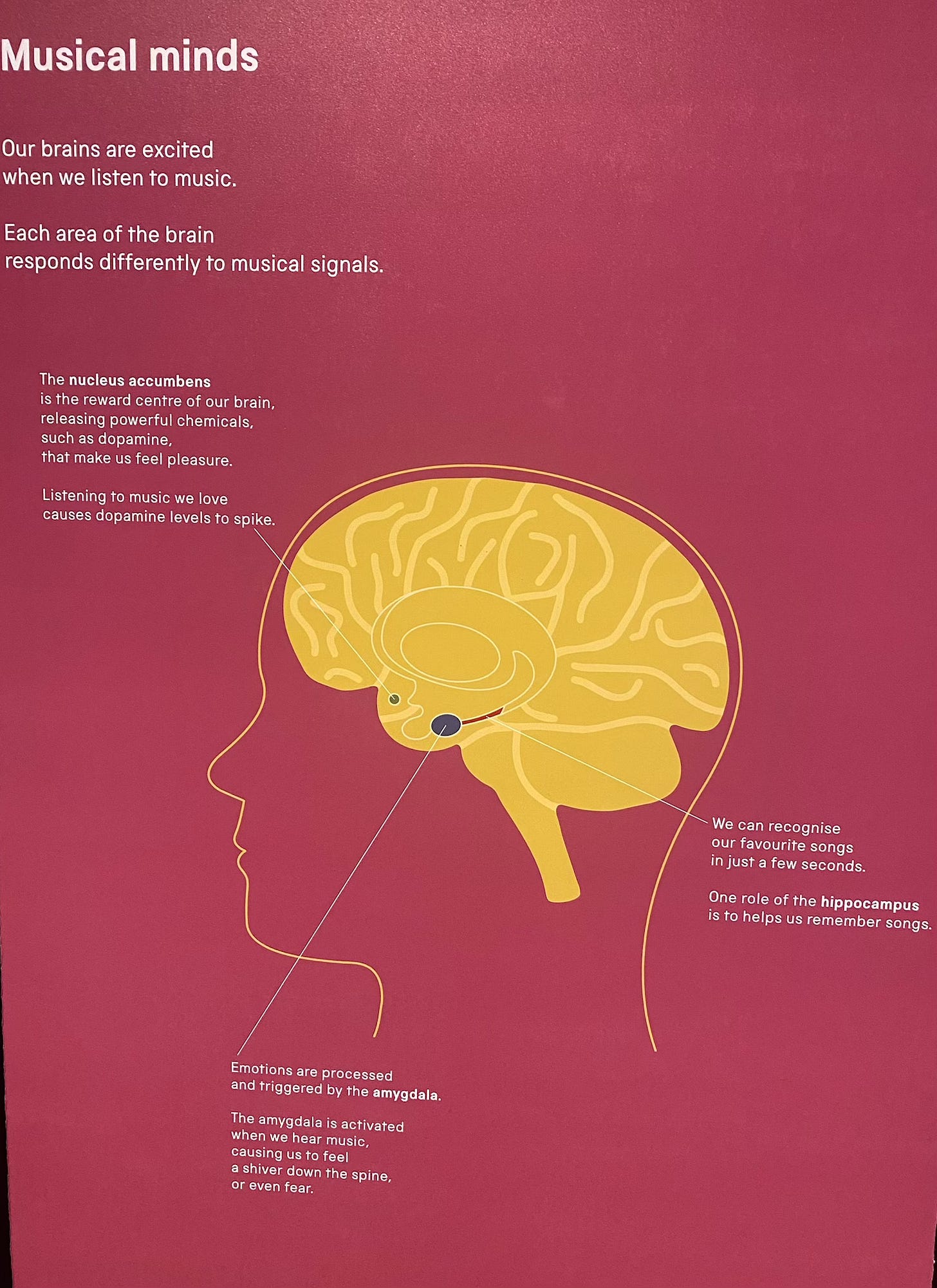I love an awards show. When we were still living in Canada, I watched the Oscars, Golden Globes, and Grammys religiously for pleasure, but also for work. As a former fashion journalist, I often reported on awards show the morning after for local TV and other media outlets I worked for, and sometimes had to “live tweet” the shows too. (Remember when Twitter was fun?!) It was a great gig. Since moving to the UK, with the time difference, I only get the morning-after snippets of most awards shows (minus the BAFTAs) and at this point in my life, that is enough.
But for the first time in nearly 12 years, I so wished I could have watched the Grammy Awards live last Sunday, only because there is something singular about viewing a meaningful musical experience “live” as opposed to only seeing short clips, complete with other people’s commentary, often on a phone the day after. Plus, the beginnings of performances are always my favourite, and it took some time to find a video of Tracy Chapman performing from the very beginning— that magical, tear-inducing moment when the camera panned from her hands strumming her guitar in the darkness, to her smiling face before she began, “You got a fast car”. Chills.

As expected on Monday morning earlier this week, I spent way too much time scrolling through clip after clip of performances and red-carpet looks from the Grammys. But what was different this time was how many posts by Gen-Xers, and some early Millennials, were about the emotions they felt watching this year’s show, especially the performances by Joni Mitchell and Tracy Chapman.
“Just another Gen-Xer crying over here,” wrote one writer I follow on Instagram on a post about Chapman’s performance of “Fast Car” with Luke Combs.1 “Joni just slayed me,” wrote a friend in Canada. I am including Annie Lennox’s In Memoriam performance and her rendition of Sinéad O’Connor’s “Nothing Compares to You” because I think both Lennox and O’Connor, and their music, evoke similar nostalgic and emotional sentiments for many of us who grew up in the 80s and 90s.
As I wrote before about musical memory, we all have our own experiences with nostalgia around music, and certain songs activate poignant memories. But these Grammy performances seemed to activate the memories of an entire generation (or two in the case of Millennials born in the early 80s), especially if you grew up in the 1970s, 80s or 90s in certain parts of the world.2
Like the early languages we acquire, or ones that engage the limbic system, which involves processing emotions and controlling memory, the music we are exposed to at certain parts of our lives, especially impressionable early years or when we are teenagers, may have a higher emotional resonance. I always find it incredible how I still remember song lyrics I learnt 30 years ago. In this way, music and language is similar in that some languages for multilinguals, like some types of music or songs for all of us, have higher emotional resonance.
There is a brilliant exhibit at the Science Museum in London now all about the power of music and how it affects us. One of the researchers quoted in the exhibit, Alexandra Lamont, a professor of music psychology, answers the question why music triggers memories. She says:
“When we hear a song we know, memory stores in our brain, such as the hippocampus are triggered. Some musical triggers are very personal. Certain pieces of music become associated with important emotional times in our lives, such as adolescence. We don’t always know why some musical memories are stronger than others. Hearing a piece of music can transport us back in time.”
Tracy Chapman’s “Fast Car” always transports me back in time, when I am yes, driving around in my little red car, complete with a tape deck, around the streets of my hometown, the same one where Joni Mitchell grew up—look at that beautiful coincidence & parallel! If you want to read more about Mitchell and Saskatoon, Saskatchewan, where we both spent our formative (music) years, I wrote something for the Financial Times back in 2015 about one of Mitchell’s other “returns” to the spotlight. And if you can’t quite place where you know “Both Sides Now” from, the song she performed on Sunday night at the Grammys with Brandi Carlile, it might be from this incredible scene:
Thank you for reading and please share your musical memories in the comments. I would love to hear them.
Final housekeeping note: I have turned paid subs back on but if your circumstances have changed for any reason, I completely understand. And if you want to upgrade to paid, I have some fun things planned here and plenty of book news coming up. Either way, thank you!
I have a lot of feelings and thoughts on Luke Combs performing with Tracy Chapman and his version of “Fast Car” as a white man in country, but others have also written about this so will leave it at that.
I did some simple math (!) and realized with the four artists – Mitchell, Lennox, Chapman and O’Connor — three-and-a-half decades are covered: Joni Mitchell is 80 years old and gained popularity in the 1970s; Lennox, who is 69 is associated with the early 80s, especially as part of the Eurythmics; Chapman, 59 is late 80s/early and mid 90s (“Fast Car” came out in 1988) and O’Connor who would have turned 57 last December gained popularity in the early 90s. It all lines up with Gen X (1965-1980) and early Millennials (born after 1981). Also, please go listen to Chapman’s entire 1988 album. Another favourite of mine is “Mountains o' Things”.





I want to hit the LOVE button! Please send me the link to TC singing the beginning notes, would love to see that!
I recently played / sung Joni’s both sides now (cover) at a local market, and a woman in her late 50s came up to me and thanked me for singing it - for it made her feel her younger self. It was very special. Tracy Chapman’s “if not now” transports me to my early 20s being on the train to & from my university campus, thinking about a boy/my then love interest in my journalism 101 class (I still feel shy when I listen to it!).